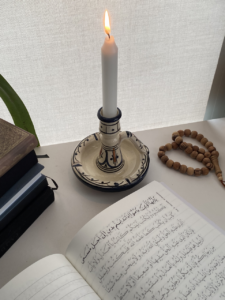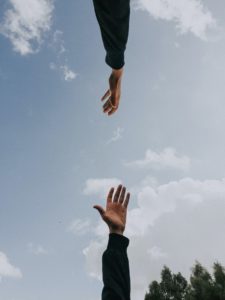How to live a Mindful Life as a Muslim
I think we can all agree that finding moments of peace in this dunya can be quite a challenge at times. I mean, the hustle and bustle of life makes it easy to lose track of what our actual purpose is. Yet, the principles of mindful living are deeply embedded in Islam and by making a conscious effort to integrate them into our daily routines, we can truly feel a sense of tranquility and connectedness to The One who matters the most.
Understanding Mindfulness in Islam
Mindfulness simply means being present in the moment, embracing a slow life and listening to how your body, mind and soul actually feel. The Quran and many hadith emphasize the importance of consciousness and reflection in our actions. They encourage us to live thoughtfully and purposefully in accordance to what Allah expects from us. In fact, the word “Taqwa“, which can be translated as ‘God-consciousness‘, perfectly encapsulates this idea. But how can we actually put that into practise?
1. Salah as a Practice of Presence
One of the most profound ways Islam incorporates mindfulness is through the five daily prayers. They aren’t merely obligations ordered upon us but opportunities to pause, reflect, and reconnect with Allah. Each Salah requires full attention and concentration and by focusing on each words, we can truly cultivate a deeper presence and serenity. In fact, have you ever thought about how the movements we do during Salah are very specific and somehow similar to Yoga positions? Obviously their meanings and purposes are completely different but ultimately, Salah does relax our bodies and soothes our souls, just like Yoga does for those who practise it. I’ve actually shared this video in collaboration with Minara where I share the secrets behind each Salah position if you’re curious.
I’m sure you’ve heard this tip before, but if you struggle to be focused during prayer, take a moment before starting to center your mind and intentions and try to eliminate distractions by going to a calm and clean space.
2. Shukr, or The Art of Gratitude
Gratitude is certainly a cornerstone of mindful living and I always find it funny when I hear personal development gurus saying how gratitude will change your life and how the more grateful you are, the more things to be grateful you get… That’s exactly what the Quran has been teaching us ever since it was revealed! It encourages expressing gratitude not only through words but also through actions and attitudes. It tells us that we shouldn’t only be grateful for our blessings but also the tests that we’re facing (that’s actually something that I covered in this video)… And Subhan’Allah, every time you say “Alhamdulillah”, it’s like a balm to the heart that instantly makes you feel calm.
One thing you could do is to list everyday 3 things you are grateful for and really try to list different things day after day. We will never be able to enumerate all of them, but it is a good way to learn to be content with what we have.
“If you tried to count Allah’s blessings, you would never be able to number them. Surely Allah is All-Forgiving, Most Merciful.”
(16:18)
3. Hold Yourself Accountable (Muhasabah)
I love that Islam places a great emphasis on self-reflection and accountability. If we want to grow, we need to regularly assess our actions, intentions and spiritual progress. This practice is known as Muhasabah and fosters a deeper understanding of our own selves so we can align our actions with our values and duties.
You could journal about this, but personally I just love spending time on my own, ideally in nature. Don’t get me wrong, I love community moments where I get to talk for hours about Islam with amazing sisters, but I found that it’s also in these moments of isolation from people that I feel deeply connected to Allah. I actually feel that I’m not alone Subhan’Allah, am more inclined to really talk to Him, detach myself from this dunya and once again, be in the present moment. It is during these moments that I reflect upon my faith goals and try to evaluate how I’m doing so far, or upon my past mistakes, which I’m learning to forgive myself for.
I would also highly suggest listening to this khutbah to learn how Prophet Muhammad ﷺ actually used to do it.
4. Your Consumption should be Mindful too
This one won’t come as a surprise for you coming from me, but of course, Islamic teachings advocate for mindfulness in consumption. As a matter of fact, you don’t need to constantly be stimulated or rewarded by the pleasures of this dunya. The latter should be experienced in moderation so you can appreciate their benefits fully.
This applies to food, clothes, money, and even time! The concept of Halal and Haram guides us to consume what is pure and beneficial, avoiding excess and harm in all the resources Allah blesses us with. He also invites us to truly enjoy these things by slowing down, being content with little, whether it be mindful eating by savoring each bite, giving sadaqah regularly to purify your rizq and not always spend it on materialistic things, taking care of your clothes so you keep them for a long time or limiting your time on social media (I touch upon this topic in this video).
5. Practise Kind Speech to Others and Yourself
We know how harsh words can be. That is why Islam teaches the importance of mindful speech, advocating for a communication that is truthful, kind, and beneficial (something that tends to be often forgotten in the Ummah unfortunately…).
I rarely get angry Alhamdulillah. When I do though, my words often translate emotions that I feel but am not able to communicate properly or have been keeping for too long… Therefore, I end up hurting the person and myself. I’ve become way more conscious of that and have been working on it, telling myself that I should either speak good or remain silent. Now I’m trying to pause and consider the impact of what I want to say. I then communicate clarity once the anger has passed.
I also believe that when Prophet Muhammad ﷺ said to be compassionate, it wasn’t just for us to show empathy and be active listeners to the people around us but also, show ourselves some mercy. I’ve touched upon this before: a lot of us can be incredibly kind to everyone but themselves. Mindfulness implies that you acknowledge your worth as a person and are certain that you are loved by Allah so you can show yourself some love too.
Sufyan ibn Abdullah reported: I said, “O Messenger of Allah, tell me of a matter I can depend upon?” The Messenger of Allah, peace and blessings be upon him, said, “Say: My Lord is Allah. Then, remain upright.” I said, “O Messenger of Allah, what do you fear most for me?” The Prophet pointed to his tongue and then he said, “This.”




